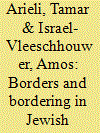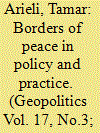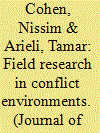| Srl | Item |
| 1 |
ID:
168588


|
|
|
|
|
| Summary/Abstract |
Cultural and religious concepts of space inform contemporary social and political identities, confirming the inherent embeddedness of borders in social life. This study analyzes concepts of borders and bordering processes in socially heterogeneous and politically sensitive environments, as portrayed in classic Jewish texts. Jewish-legal rabbinic writings dated from the first to the fifth century reveal perceptions of both concrete and metaphysical aspects of a territorial homeland and of social-spatial bordering. These perceptions are echoed in contemporary debates of national sovereignty and borders.
|
|
|
|
|
|
|
|
|
|
|
|
|
|
|
|
| 2 |
ID:
115045


|
|
|
|
|
| Publication |
2012.
|
| Summary/Abstract |
Border-management policies are designed to balance national interests of border control with the costs of monitored cross-border interaction. These policies, formulated by national authorities, are often based on constructed definitions and interests of national security rather than wider understandings of the components of human security. This is especially evident in post-conflict borders where local initiatives of economic, social and environmental cross-border interaction are posed to contribute to regional stability and security. This article analyzes civilian cross-border cooperation in the southern section of the Israel-Jordan border region, distinguishing between local and national perspectives regarding border management. Focusing mainly on Israel's policies the article demonstrates how despite the vision of good neighbourly relations and their potential contribution towards regional prosperity and stability, local cross-border initiatives have been inhibited in the name of national security. The case study demonstrates the mechanisms and ramifications of exclusive securitisation policies of post-conflict border management.
|
|
|
|
|
|
|
|
|
|
|
|
|
|
|
|
| 3 |
ID:
109909


|
|
|
|
|
| Publication |
2011.
|
| Summary/Abstract |
Conducting research in conflict environments is a challenge, given their complexity and common attitudes of distrust and suspicion. Yet, conflict and methodology are usually analyzed as separate fields of interest. Methodological aspects of field work in conflict environments have not been systematically analyzed. This article addresses the central methodological problems of research conducted in conflict environments. We suggest the use of the snowball sampling method (hereafter, SSM) as an answer to these challenges. The effectiveness of this method has been recognized as significant in a variety of cases, mainly regarding marginalized populations. We claim that in conflict environments, the entire population is marginalized to some degree, making it 'hidden' from and 'hard to reach' for the outsider researcher. The marginalization explains why it is difficult to locate, access and enlist the cooperation of the research populations, which in a non-conflict context would not have been difficult to do. SSM directly addresses the fears and mistrust common to the conflict environment and increases the likelihood of trusting the researcher by introduction through a trusted social network. We demonstrate how careful use of SSM as a 'second best' but still valuable methodology can help generate cooperation. Therefore, the evaluation of SSM, its advantages and limitations in implementation in conflict environments can be an important contribution to the methodological training of researchers. In addition to its effectiveness under conditions of conflict, SSM may, in some cases, actually make the difference between research conducted under constrained conditions and research not conducted at all. Together with our experiences in the field, we supply several insights and recommendations for optimizing the use of SSM in a conflict environment.
|
|
|
|
|
|
|
|
|
|
|
|
|
|
|
|